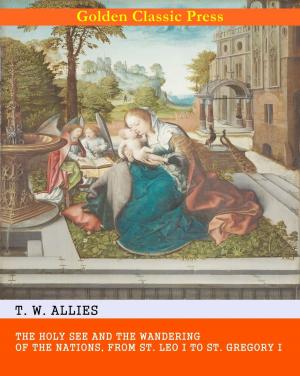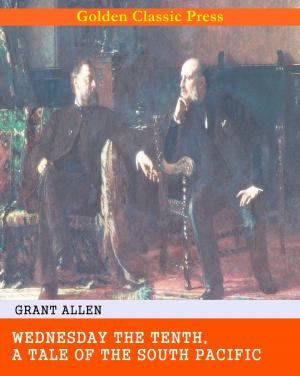| Author: | E. F. Benson | ISBN: | 1230002953137 |
| Publisher: | GOLDEN CLASSIC PRESS | Publication: | November 30, 2018 |
| Imprint: | Language: | English |
| Author: | E. F. Benson |
| ISBN: | 1230002953137 |
| Publisher: | GOLDEN CLASSIC PRESS |
| Publication: | November 30, 2018 |
| Imprint: | |
| Language: | English |
*** Original and Unabridged Content. Made available by GOLDEN CLASSIC PRESS***
Synopsis:
Dodo (Volumes 1 and 2 of 2) - A Detail of the Day by E. F. Benson
And far out, drifting helplessly on that grey, angry sea, I saw a small boat at the mercy of the winds and waves. And my guide said to me, 'Some call the sea "Falsehood," and that boat "Truth," and others call the sea "Truth," and the boat "Falsehood;" and, for my part, I think that one is right as the other.'—The Professor of Ignorance.
Poets of all ages and of all denominations are unanimous in assuring us that there was once a period on this grey earth known as the Golden Age. These irresponsible hards describe it in terms of the vaguest, most poetic splendour, and, apart from the fact, upon which they are all agreed, that the weather was always perfectly charming, we have to reconstruct its characteristics in the main for ourselves. Perhaps if the weather was uniformly delightful, even in this nineteenth century, the golden age might return again. We all know how perceptibly our physical, mental and spiritual level is raised by a few days of really charming weather; but until the weather determines to be always golden, we can hardly expect it of the age. Yet even now, even in England, and even in London, we have every year a few days which must surely be waifs and strays from the golden age, days which have fluttered down from under the hands of the recording angel, as he tied up his reports, and, after floating about for years in dim, interplanetary space, sometimes drop down upon us. They may last a week, they have been known to last a fortnight; again, they may curtail themselves into a few hours, but they are never wholly absent.
At the time at which this story opens, London was having its annual golden days; days to be associated with cool, early rides in the crumbly Row, with sitting on small, green chairs beneath the trees at the corner of the Park; with a general disinclination to exert oneself, or to stop smoking cigarettes; with a temper distinctly above its normal level, and a corresponding absence of moods. The crudeness of spring had disappeared, but not its freshness; the warmth of the summer had come, but not its sultriness; the winter was definitely over and past, and even in Hyde Park the voice of the singing bird was heard, and an old gentleman, who shall be nameless, had committed his annual perjury by asserting in the Morning Post that he had heard a nightingale in the elm-trees by the Ladies' Mile, which was manifestly impossible.
The sky was blue; the trees, strange to say, were green, for the leaves were out, and even the powers of soot which hover round London had not yet had time to shed their blackening dew upon them. The season was in full swing, but nobody was tired of it yet, and "all London" evinced a tendency to modified rural habits, which expressed themselves in the way of driving down to Hurlingham, and giving water parties at Richmond.
*** Original and Unabridged Content. Made available by GOLDEN CLASSIC PRESS***
Synopsis:
Dodo (Volumes 1 and 2 of 2) - A Detail of the Day by E. F. Benson
And far out, drifting helplessly on that grey, angry sea, I saw a small boat at the mercy of the winds and waves. And my guide said to me, 'Some call the sea "Falsehood," and that boat "Truth," and others call the sea "Truth," and the boat "Falsehood;" and, for my part, I think that one is right as the other.'—The Professor of Ignorance.
Poets of all ages and of all denominations are unanimous in assuring us that there was once a period on this grey earth known as the Golden Age. These irresponsible hards describe it in terms of the vaguest, most poetic splendour, and, apart from the fact, upon which they are all agreed, that the weather was always perfectly charming, we have to reconstruct its characteristics in the main for ourselves. Perhaps if the weather was uniformly delightful, even in this nineteenth century, the golden age might return again. We all know how perceptibly our physical, mental and spiritual level is raised by a few days of really charming weather; but until the weather determines to be always golden, we can hardly expect it of the age. Yet even now, even in England, and even in London, we have every year a few days which must surely be waifs and strays from the golden age, days which have fluttered down from under the hands of the recording angel, as he tied up his reports, and, after floating about for years in dim, interplanetary space, sometimes drop down upon us. They may last a week, they have been known to last a fortnight; again, they may curtail themselves into a few hours, but they are never wholly absent.
At the time at which this story opens, London was having its annual golden days; days to be associated with cool, early rides in the crumbly Row, with sitting on small, green chairs beneath the trees at the corner of the Park; with a general disinclination to exert oneself, or to stop smoking cigarettes; with a temper distinctly above its normal level, and a corresponding absence of moods. The crudeness of spring had disappeared, but not its freshness; the warmth of the summer had come, but not its sultriness; the winter was definitely over and past, and even in Hyde Park the voice of the singing bird was heard, and an old gentleman, who shall be nameless, had committed his annual perjury by asserting in the Morning Post that he had heard a nightingale in the elm-trees by the Ladies' Mile, which was manifestly impossible.
The sky was blue; the trees, strange to say, were green, for the leaves were out, and even the powers of soot which hover round London had not yet had time to shed their blackening dew upon them. The season was in full swing, but nobody was tired of it yet, and "all London" evinced a tendency to modified rural habits, which expressed themselves in the way of driving down to Hurlingham, and giving water parties at Richmond.















